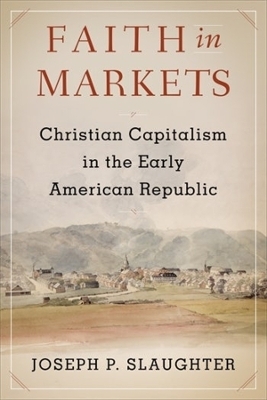
Faith in Markets
Christian Capitalism in the Early American Republic
Seiten
2023
Columbia University Press (Verlag)
978-0-231-19110-4 (ISBN)
Columbia University Press (Verlag)
978-0-231-19110-4 (ISBN)
Faith in Markets offers a new account of the interplay between religion and capitalism in nineteenth-century American history by telling the stories of the Protestant entrepreneurs who established businesses to serve as agents of cultural and economic reform.
In the first half of the nineteenth century, the United States saw both a series of Protestant religious revivals and the dramatic expansion of the marketplace. Although today conservative Protestantism is associated with laissez-faire capitalism, many of the nineteenth-century believers who experienced these transformations offered different, competing visions of the link between commerce and Christianity. Joseph P. Slaughter offers a new account of the interplay between religion and capitalism in American history by telling the stories of the Protestant entrepreneurs who established businesses to serve as agents of cultural and economic reform.
Faith in Markets examines three Christian business enterprises and the visions of a Christian marketplace they represented. Shaped by Pietist, Calvinist, and Arminian theologies, each offered different answers to the question of what a moral, Christian market should look like. George Rapp & Associates operated sophisticated textile factories as the business side of the model community the Harmony Society, which practiced communal living in pursuit of a harmonious workforce. The Pioneer Stage Coach Line provided transportation services only six days a week to keep Sunday sacred, attempting to reform society by outcompeting less pious businesses. The publisher Harper & Brothers sought to elevate American culture through commerce by producing virtuous products like lavishly illustrated Bibles. Drawing on a wide range of sources, Faith in Markets explores how the founders and owners of these enterprises infused their faith into their businesses and, in turn, how distinctly religious businesses shaped American capitalism and society.
In the first half of the nineteenth century, the United States saw both a series of Protestant religious revivals and the dramatic expansion of the marketplace. Although today conservative Protestantism is associated with laissez-faire capitalism, many of the nineteenth-century believers who experienced these transformations offered different, competing visions of the link between commerce and Christianity. Joseph P. Slaughter offers a new account of the interplay between religion and capitalism in American history by telling the stories of the Protestant entrepreneurs who established businesses to serve as agents of cultural and economic reform.
Faith in Markets examines three Christian business enterprises and the visions of a Christian marketplace they represented. Shaped by Pietist, Calvinist, and Arminian theologies, each offered different answers to the question of what a moral, Christian market should look like. George Rapp & Associates operated sophisticated textile factories as the business side of the model community the Harmony Society, which practiced communal living in pursuit of a harmonious workforce. The Pioneer Stage Coach Line provided transportation services only six days a week to keep Sunday sacred, attempting to reform society by outcompeting less pious businesses. The publisher Harper & Brothers sought to elevate American culture through commerce by producing virtuous products like lavishly illustrated Bibles. Drawing on a wide range of sources, Faith in Markets explores how the founders and owners of these enterprises infused their faith into their businesses and, in turn, how distinctly religious businesses shaped American capitalism and society.
Joseph P. Slaughter is assistant professor of history at Wesleyan University.
Introduction: Early Nineteenth-Century Capitalism and Religion
Part I: Christian Communal Capitalism
1. Communal Industry: Harmonie, Pennsylvania
2. Industry on the Frontier: Harmonie, Indiana
3. Republican Industry: Economie, Pennsylvania
Part II: Christian Reform Capitalism
4. The Sabbatarians
5. The Pioneers
6. Conflict, Defeat, and Victory
Part III: Christian Virtue Capitalism
7. Methodist Printer-Publishers
8. Creating a Moral Republic
9. Fostering an American Protestant Identity
Conclusion: Morality and Markets, Then and Now
Acknowledgments
Notes
Bibliography
Index
| Erscheinungsdatum | 21.10.2023 |
|---|---|
| Reihe/Serie | Columbia Studies in the History of U.S. Capitalism |
| Zusatzinfo | 49 figures |
| Verlagsort | New York |
| Sprache | englisch |
| Maße | 152 x 229 mm |
| Themenwelt | Geisteswissenschaften ► Geschichte ► Regional- / Ländergeschichte |
| Geschichte ► Teilgebiete der Geschichte ► Wirtschaftsgeschichte | |
| Religion / Theologie ► Christentum ► Kirchengeschichte | |
| Wirtschaft ► Volkswirtschaftslehre | |
| ISBN-10 | 0-231-19110-3 / 0231191103 |
| ISBN-13 | 978-0-231-19110-4 / 9780231191104 |
| Zustand | Neuware |
| Haben Sie eine Frage zum Produkt? |
Mehr entdecken
aus dem Bereich
aus dem Bereich
die Ukraine, Polen und der Irrweg in der russischen Geschichte
Buch | Hardcover (2023)
C.H.Beck (Verlag)
28,00 €


